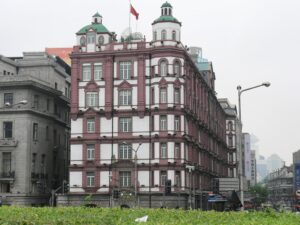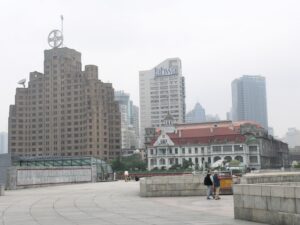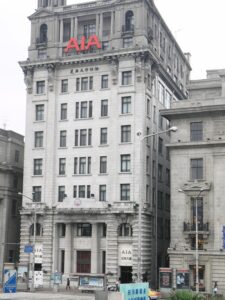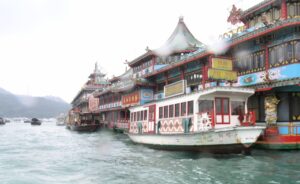May 21, 2006
 I am mentally still in Shanghai. The old city–in these pictures–still in my head. The old Palace Hotel from 1906, where I have stayed; the Broadway Mansions, a mid-30s creation. It was headquarters of the American military during the Chinese Civil War.
I am mentally still in Shanghai. The old city–in these pictures–still in my head. The old Palace Hotel from 1906, where I have stayed; the Broadway Mansions, a mid-30s creation. It was headquarters of the American military during the Chinese Civil War.
However, I’m no longer in Shanghai. It is 7:30 am and I am in Hong Kong, ready for another day in one of my favorite cities (and certainly one of my favorite locations for a city) in the world.
Hong Kong, which means–ironically–fragrant harbor, is part of China, but a special area. Mainlanders need a visa to enter the city, which was part of the British Empire until ten years ago. With 7 million people, it is one of the densest populated cities in the world.

We got in Saturday afternoon, and so Sunday at 6am, I was on the Star Ferry, riding across the bay from Kowloon (9 dragons–sounds like a patrol) to the main island, and back. Yesterday we had the sightseeing tour, though in the fog and rain (the aftermath of the typhoon), it was hard to see anything. It is a city where everyone is out and up and hustling, nearly 24 hours a day.
David joined me at 1 am, which made for a rather long day yesterday, but it is good to see him and spend some time.
 As for China, a few comments:
As for China, a few comments:
1) There is censorship, but I don’t think that was the reason my last email ended so abruptly. I hit the wrong key, the instructions came up in Chinese, and it locked, so I sent the message and quit. Still, when I was watching CNN, they were interviewing someone and when they asked him a question about China, the screen went blank. Kevin Eack says they read every email, but I think they just have the capability to do so. Reading about the Olympics, they already have 260,000 surveillance cameras in Beijing and plan to add more….I think he’s envious
Their effort to control information and the “wrong” kind of information has been one of the most intriguing things to follow as the electronic revolution flattens the world. As I told our guide, you look foolish when you say something that is easily verified to be not true. Coming to Hong Kong, which has a free press, stories which we read on the mainland have a totally different slant here. For example, on Saturday, the Chinese poured the last concrete for the “new great wall,” the Three Gorges Dam. In the China Daily, the verbiage was about the great accomplishment, the flood control, electricity, etc. The HK South China Morning Post article was about displacement and environmental damage.
2) I left off talking (I think) about the 1930s Bund, which has the same foreign-built buildings it had on the eve of World War II. Shanghai as I think I wrote, is coming to grips with the fact that it owes much of its greatness to the fact that for a century it had foreign domination–an international settlement that because of its semi-independent status allowed refugees from Europe to settle there without a passport. Hence, at one time there were 30,000 stateless Jews fleeing Nazi Germany, and probably an equal number of Russians fleeing the revolution. Today, it is one of the most cosmopolitan cities in China. I liken Shanghainese to New Yorkers for a lot of similar center-of-the-universe traits
3) Two quick metaphors on where China has been (I have that perspective from the 1990s–my first trip here was 1990) and where I think it might be going.
a) Mayor Daley was in Beijing last week. David said the Trib featured him on page one, with a dust storm that has been bedeviling the capital city. Pollution and environmental damage–and the challenges of feeding, clothing, and housing a population on an economic binge (Beijing has 2.6 million cars, with 1,000 new ones added each day) highlight some of the negatives.
The report noted that Chicago added Chinese to the school curriculum in 1999, and now has the largest public school system Chinese instruction in the US, but Daley’s visit was not just about tribute, but trade–he was seeking investment in the Chicago area (and seeking tips on how to bid for the Olympic games in 2016).
Flash back to Fred’s visit in 1993, when he went to the new area in Shanghai (Pudong). At the time, it was rice fields. The folks building the new area were seeking US investment. A little over a decade later, we are seeking Chinese investors.
Again, regarding Pudong, when we were there in ’93, there was absolutely nothing there, except plans. The planners showed us what the city would look like. I was skeptical. There was incredible chaos in China. Today, Pudong looks like the plans, with about 4 million people, the tallest building in China, and it is the financial capital for the PRC. As I told my students, never say China cannot do…they can and they will. So learn Chinese, and be prepared to work as hard as they seem willing to….
4) Along the same lines, we were guests of Mizuno, a Japanese company in Shanghai (the president was an IWU alum). As is often the case with manufacturing, they had moved the factory to China, and were keeping the  value-added parts in Japan. However, they did have research and development in China–and we read about Hewlett Packard, which has laid off 14,000 people worldwide, hiring 1000 Chinese engineers. Learn Chinese and be prepared to work as hard as they seem willing to….
value-added parts in Japan. However, they did have research and development in China–and we read about Hewlett Packard, which has laid off 14,000 people worldwide, hiring 1000 Chinese engineers. Learn Chinese and be prepared to work as hard as they seem willing to….
As you can tell, it’s fun coming back and seeing the changes, but I think China will have to address its rural issues, because unrest on the farms has begun to be mentioned even in the controlled press.
We are off to Chinese university for a full day of talks with and by visiting Fulbright scholars, and then an evening with a dinner set up by a friend of mine whom I met originally in Viet Nam.
Hope you all had a great weekend and are looking forward to the end of the semester and a summer full of Troop 19 experiences. I am!